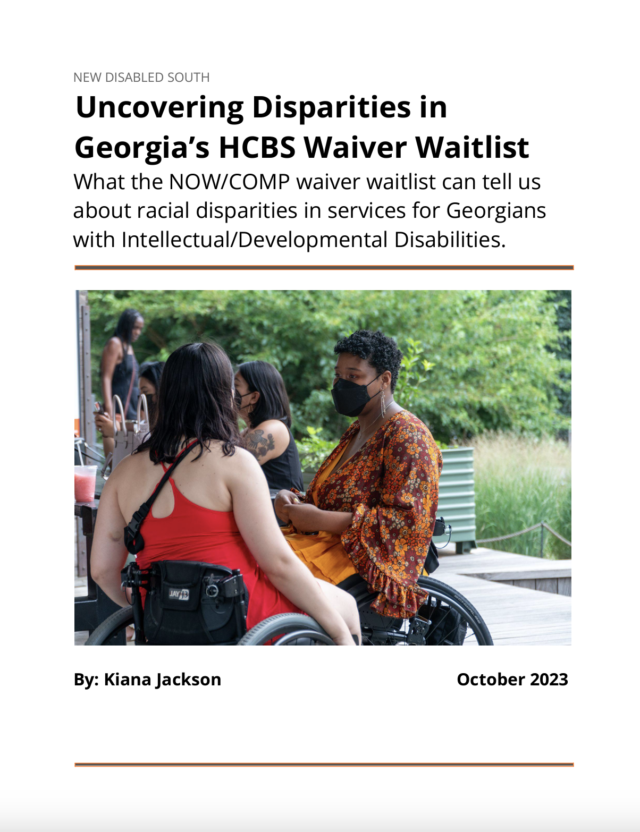New Report Suggests Racial Disparities for Communities of Color in Obtaining Services for Georgia's Waiver Waitlists
Families of adults with developmental disabilities (DD) often find themselves as primary caregivers because they do not want the relative to be institutionalized and alternative options are not always readily available.
Individuals with DD who have been referred to a nursing home or other institutional level of care, may be eligible for home and community-based services (HCBS) through Georgia’s Medicaid program that would allow them to live at home. According to literature provided by the Georgia Department of Community Health (DCH), “Home and Community Services A Guide to Medicaid Waiver Programs in Georgia,” many of these services are called waiver programs, because the Centers for Medicare & Medicaid Services (CMS) allows states to “waive” certain Medicaid requirements and pay for HCBS as an alternative to living in a nursing home or other type of healthcare facility or institution.
The pamphlet goes on to explain that “although different waiver programs offer different services, they have some things in common. Each program is designed to help people who qualify for institutional care to remain in the community or return to the community from nursing homes, hospitals or other long-term institutions.”
But qualifying for these benefits doesn’t always ensure that the person with the disability will receive them in a timely manner. Sometimes people may meet the criteria to receive Medicaid services under a waiver program but will be placed on a waiting list to actually receive a waiver. Funding for Georgia's New Option Waiver Program (NOW) and Comprehensive Supports Waiver Program (COMP) is limited and only a certain number of people can receive services based on available funds. This means there are nearly always people on the waiting lists for the HCBS waivers.
The state’s literature goes on to state that “a person may be selected from the waiting list to receive services based on the severity of need, the availability of informal/family support, the length of time on the waiting list, and a person’s continued eligibility for the level of care provided in a nursing home or ICF-ID/DD [intermediate care facility for individuals with intellectual or other developmental disabilities]."
Data Points to Racial Disparities
 A report released in October of 2023 by New Disabled South, a nonprofit that says it is “building a coalition of disability justice activists, advocates and organizations in the South,” used data provided by the state of Georgia to indicate that there is racial bias in approving funds to individuals on the waitlist. In New Disabled South’s report, “Uncovering Disparities in Georgia’s HCBS Waiver Waitlist,” the introduction to the executive summary points out that “troubling disparities have emerged in the distribution and utilization of [HCBS] waivers, with stark disparities in access and availability based on race.“
A report released in October of 2023 by New Disabled South, a nonprofit that says it is “building a coalition of disability justice activists, advocates and organizations in the South,” used data provided by the state of Georgia to indicate that there is racial bias in approving funds to individuals on the waitlist. In New Disabled South’s report, “Uncovering Disparities in Georgia’s HCBS Waiver Waitlist,” the introduction to the executive summary points out that “troubling disparities have emerged in the distribution and utilization of [HCBS] waivers, with stark disparities in access and availability based on race.“
According to New Disabled South’s research, “75% of people on these waiting lists in this country reside in the South, and coupled with a nationwide shortage of care workers due to poverty wages, there is a critical care crisis facing the disability community, particularly those with I/DD [intellectual or other developmental disabilities].”
Currently, there are more than 7,100 people in the state of Georgia on the waiting list for NOW and COMP HCBS waivers. As New Disabled South advocated around this issue with state legislators in 2023, the organization learned through anecdotes and personal stories that many people impacted by this waiting list had been on it for as long as 10 to 20 years. Many of those accounts were from people of color.
According to a letter sent by New Disabled South’s CEO Dom Kelley to Georgia Governor Brian Kemp and other state officials, the organization’s analysis found that white people are “significantly overrepresented” on NOW and COMP waiver waiting lists, while Black and Latinx people are “grossly underrepresented.”
The disparities were particularly notable when comparing the racial breakdown of Georgia’s overall population with the demographic makeup of those on the waitlist for HCBS waivers. According to data from the U.S. Census Bureau, about 60% of Georgia’s population is white, 32% is Black or African American, and about 10% is Hispanic or Latino.
But according to data provided by the Georgia Department of Community Health and cited by New Disabled South, nearly 90% of those on the waiting list for NOW and COMP waivers in Georgia are white, while Black or African American people represent only about 7% and Latinx people represent just over 1% of those on the waiting list.
“We assert that these disparities point to deep systemic racism and ableism in the way Georgia determines who gets access to support and who doesn’t,” Kelley wrote in the letter, which was dated April 17, 2023.